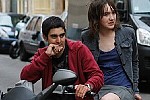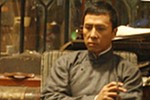 Shadows off the beaten path
Shadows off the beaten pathIP MAN | THIRST
< < F O R E I G N > >
last update 11.Oct.09
See also: SHADOWS FILM FESTIVAL
 R E V I E W B Y R I C H C L I N E
R E V I E W B Y R I C H C L I N E
prd Moshe Danon, Thanassis Karathanos
with Fouad Habash, Shahir Kabaha, Hilal Kabob, Ibrahim Frege, Eran Naim, Scandar Copti, Ranin Karim, Youssef Sahwani, Elias Saba, Nisrine Rihan, Abu George Shibli, Sigal Harel

release Isr 17.Sep.09,
US 3.Feb.10, UK 18.Jun.10
09/Israel 2h00
CANNES FILM FEST
TORONTO FILM FEST

 A searing story of the collision of three religious communities in Israel, this provocative street-level drama feels thoroughly realistic, with vivid characters that cut through the fragmented story structure.
A searing story of the collision of three religious communities in Israel, this provocative street-level drama feels thoroughly realistic, with vivid characters that cut through the fragmented story structure.
In the Ajami neighbourhood of Jaffa, Omar (Kabaha) is the target of a gang feud involving his uncle. While his pre-teen brother Nasri (Habash) watches, he gets himself deeper into trouble trying to find a solution, including a dangerous decision to sell drugs for pay-off money. Caught in this mess is Malek (Frege), a 16-year-old Palestinian who needs money for his mother's medical bills. But this creates serious trouble for Omar and Malek's Christian boss Anan (Kabob) and his father (Sahwani). Not to mention a Jewish cop (Naim) trying to stop the deal.
Filmmakers Copti and Shani capture the situation with striking realism, using offhanded performances and eerily authentic interaction between the various groups of people. When the film gets violent, it feels sudden and terrifying. And the relationships are both emotionally raw and humorously lively. The film is structured in five chapters that attempt to twist the time-scale Pulp Fiction-style, fracturing the narrative and circling around to fill in details and revelations later. Sometimes this works, but it often leaves us wondering what's actually going on.
That said, the plot itself is the least of our concerns, as the filmmakers so adeptly capture the characters' overpowering sense of vulnerability. And that's what this film is really about. All of these communities rely on each other, even as they're threatened and try to keep each other at arm's length. And within the Muslim community, there is strong tension between clans, as witnessed in a revealing reconciliation session between two warring families.
The script cleverly includes strong interpersonal relationships that we can identify with, such as Omar's forbidden love for Anan's sister (Karim), the two brothers' desperation to protect each other and the cop's turbulent family life. As tit-for-tat revenge rears its ugly head, the film gets increasingly harsh and dark, and we realise that most people are using religion as an excuse to indulge in brutal "solutions" to their frustrations. But of course they're only fuelling a pointless cycle of violence.
1.Oct.09 lff
 R E V I E W B Y R I C H C L I N E
R E V I E W B Y R I C H C L I N E
prd Rachid Bouchareb, Muriel Merlin
with Julie Sokolowski, Yassine Salime, Karl Sarafidis, David Dewaele

release Fr 25.Nov.09,
US 24.Dec.10, UK 17.Feb.12
09/France 1h45
TORONTO FILM FEST

 Instead of his usual confrontational style, Dumont infuses this reflective drama with raw tenderness. But he's as provocative as always. Which is probably unavoidable with a film about religious devotion (the title refers to a 13th century Flemish poet).
Instead of his usual confrontational style, Dumont infuses this reflective drama with raw tenderness. But he's as provocative as always. Which is probably unavoidable with a film about religious devotion (the title refers to a 13th century Flemish poet).
The young novice Celine (Sokolowski) is asked to leave the convent because she refuses to eat. The problem is that she's so overwhelmed by her faith that food seems unnecessary to her. Her love for God knows no bounds, and she's determined to feel him in every moment. She returns to her wealthy parents' lavish Paris flat and meets the young Muslim Yassine (Salime) in a cafe. He's attracted to her but respects her vow of celibacy. And it's his brother Nassir (Sarafidis) who catches her interest with discussions about active Islam.
There are elements here that echo Dumont's previous work (such as the foreboding tone and the interaction with nature). But what's surprising is the overwhelming gentleness, even as the film begins to explore the kind of religious fervour that inspires violence. Dumont is equating the passion a young nun feels while praying with a suicide bomber's ecstatic state of mind. And the film takes such a delicate approach that we start to understand how this might be true.
Sokolowski delivers a raw, deeply felt performance with minimal flourishes. The camera often lingers on her almost saintly face as she experiences life and sees God in art and nature. And Sokolowski's scenes with the other actors are charged with a remarkable combination of holiness and naivete. It's as if Celine has some kind of divine protection simply because her heart is so pure. While it may be hard to believe that such a fervent Christian could so easily join a fanatic Islamic sect, we can see in her eyes that there is no conflict. Until later.
Dumont tells this increasingly unnerving story with scenes that are often still and silent. He continually contrasts sights, sounds and situations, such as sequences in which Celine attends a scruffy outdoor rave and then later listens to a classical string ensemble in a church. Throughout the film, Dumont skilfully maintains a feeling of uncertainty; we never know what will happen next. And even if some of what happens isn't hugely convincing (or clear), it really gets us thinking.
12.Oct.09 lff
 R E V I E W B Y R I C H C L I N E
R E V I E W B Y R I C H C L I N E
scr Edmond Wong
prd Raymond Wong
with Donnie Yen, Lynn Hung, Simon Yam, Hiroyuki Ikeuchi, Fan Siu-Wong, Ka Tung Lam, Xing Yu, Wong You-Nam, Chen Zhi-Hui, Li Ze, Calvin Cheng, To Yu-Hang
 release Chn 12.Dec.08,
release Chn 12.Dec.08, UK 2.Oct.09
08/China 1h46
 A terrific true story, clearly elevated to mythical proportions, this film benefits hugely from the lucid fight direction by the master Sammo Hung, which gives the film a remarkable resonance by letting us see the characters' personalities in their every move.
A terrific true story, clearly elevated to mythical proportions, this film benefits hugely from the lucid fight direction by the master Sammo Hung, which gives the film a remarkable resonance by letting us see the characters' personalities in their every move.
In 1930s provincial China, Ip (Yen) is a very private wing chun master who doesn't want to run a school or prove his skill. With virtually no aggression, he easily beats anyone who challenges him, so the town knows he's the true local master. And an interloping thug (Fan) finds this out the hard way. Ip remains quietly devoted to his wife and son (Hung and Li), but after Japan invades China, things get very difficult. Especially when Ip stands up to both the returning thug and the Japanese general (Ikeuchi).
Clearly, Ip is a national treasure in China and, for sheer inspirational value, he deserves to be. Yes, the filmmakers show perhaps too much reverence for him, implying that he singlehandedly defeated the invading Japanese army as they build to a Rocky-style finale and a coda that mentions how Ip taught Bruce Lee everything he knew. But it also has to be said that they state their case effectively, portraying Ip as a steely, calm genius who always deflected attention away from himself and only reluctantly became a hero.
Yen is excellent in the role, lending the fight scenes a surprising edge. The battle choreography is fiendishly clever, and Yen stays utterly cool and focussed, building in wry humour and emotional undercurrents along the way. Ip's unbending pride is perhaps his only flaw, and yet it's great fun to watch him humiliate his opponents and motivate those around him to stand up for themselves, most engagingly the workers in a factory owned by his lifelong friend Quan (Yam).
And the filmmakers aren't afraid to get dark and tough, showing the raw brutality of war and conflict with only a bit of movie manipulation in characters who are courageous, weak or villainous. By the time we reach the climactic face-off (or three), things have become truly brutal and nasty. It might be a little exaggerated, and also fairly straightforward in its storytelling, but it's a seriously powerful tale.
3.Aug.09
 R E V I E W B Y R I C H C L I N E
R E V I E W B Y R I C H C L I N E
scr Jeong Seo-Gyeong, Park Chan-wook
prd Park Chan-wook, Ahn Soo-Hyun
with Song Kang-ho, Kim Ok-vin, Kim Hae-sook, Shin Ha-kyun, Mercedes Cabral, Park In-hwan, Oh Dal-su, Song Young-chang, Eriq Ebouaney, Lee Hwa-ryong, Ra Mi-ran, Choi Hee-jin
 release Kor 30.Apr.09,
release Kor 30.Apr.09, US 31.Jul.09, UK 16.Oct.09
09/Korea Focus 2h13
CANNES FILM FEST
 Besides the vampires, this is an oddly faithful adaptation of Emile Zola's novel Therese Raquin. Filmmaker Park directs with his usual eye-catching skill and attention to gruesome detail, and creates a story with strong emotional resonance.
Besides the vampires, this is an oddly faithful adaptation of Emile Zola's novel Therese Raquin. Filmmaker Park directs with his usual eye-catching skill and attention to gruesome detail, and creates a story with strong emotional resonance.
Priest Sang-hyeon (Song Kang-ho) voluntarily enters an African monastery to help research a deadly disease. But the mysterious illness leaves him craving human blood. He finds peaceful solutions to this, but things get complicated when he meets the sparky Tae-joo (Kim Ok-vin), who he's known since childhood in the orphanage. She's still living with her adoptive mother (Kim Hae-sook), and is now married to her adoptive brother Kang-woo (Shin). When they plot to kill Kang-woo so they can be together, this is only their first step across the line to inhumanity.
Park tells this story in a remarkably straightforward way, weaving in otherworldly elements with raw earthiness that allows for some cool, low-key effects and lots of dry humour. This keeps things relatively grounded in reality, as does an emotionally open performance by Song Kang-ho as a man who is horrified at his new inner yearnings and desperately tries to create a worldview that works for him. Around him, the characters are all too selfish or nutty for us to care about them.
This makes it impossible for us to invest in Sang-hyeon's relationship with Tae-joo. Kim Ok-vin's performance is lively and constantly surprising, but this simply isn't a character we can root for. She's far too dark and scary for that, while everyone else is either naive or self-involved. And the story turns seriously sordid, so it's a good thing that Sang-hyeon is such a complicated, likeable guy. Even his one act of sheer nastiness is almost understandable.
Yes, while this film is packed with terrific scenes and fascinating characters, the uneven tone makes it hard to engage with. The mood veers back and forth from quiet and thoughtful to gruesome and frantic. Along with the technical expertise, there are fascinating themes in here, most notably about two damaged people who are drawn to each other against their better judgement. And ultimately, it's the theme that contrasts martyrdom with suicide that sticks in the mind.
18.Aug.09


See also: SHADOWS FILM FESTIVAL
© 2009 by Rich Cline, Shadows
on the Wall